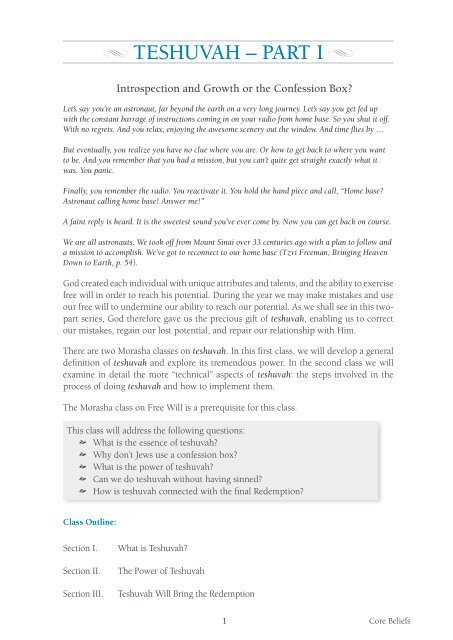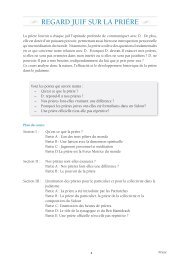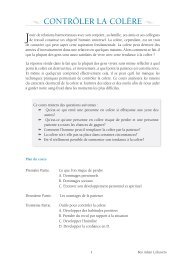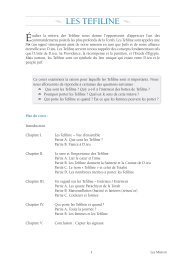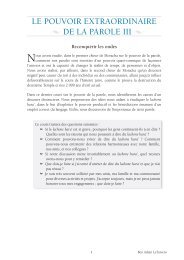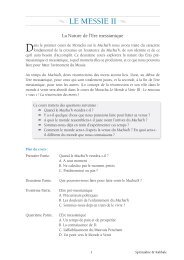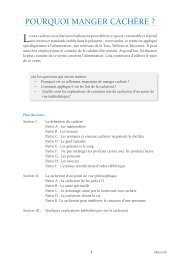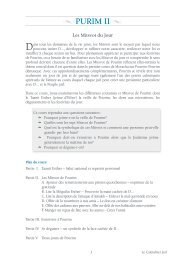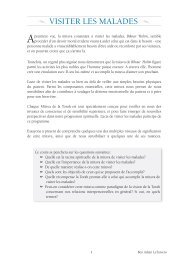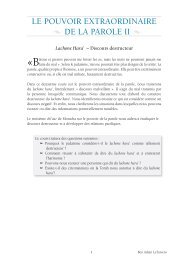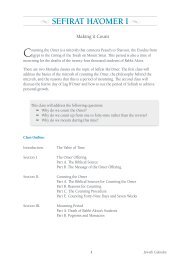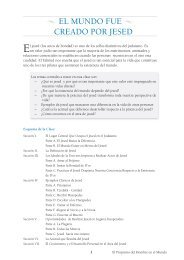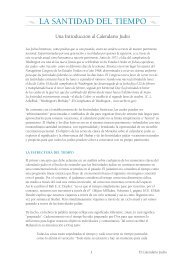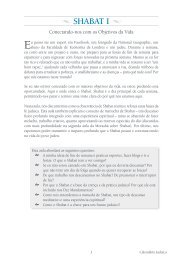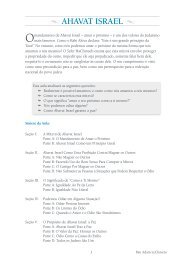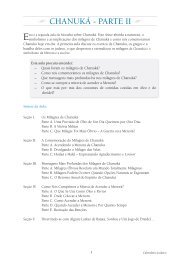Teshuvah – ParT I - Morasha Syllabus
Teshuvah – ParT I - Morasha Syllabus
Teshuvah – ParT I - Morasha Syllabus
You also want an ePaper? Increase the reach of your titles
YUMPU automatically turns print PDFs into web optimized ePapers that Google loves.
<strong>Teshuvah</strong> <strong>–</strong> <strong>ParT</strong> I<br />
Introspection and Growth or the Confession Box?<br />
Let’s say you’re an astronaut, far beyond the earth on a very long journey. Let’s say you get fed up<br />
with the constant barrage of instructions coming in on your radio from home base. So you shut it off.<br />
With no regrets. And you relax, enjoying the awesome scenery out the window. And time flies by …<br />
But eventually, you realize you have no clue where you are. Or how to get back to where you want<br />
to be. And you remember that you had a mission, but you can’t quite get straight exactly what it<br />
was. You panic.<br />
Finally, you remember the radio. You reactivate it. You hold the hand piece and call, “Home base?<br />
Astronaut calling home base! Answer me!”<br />
A faint reply is heard. It is the sweetest sound you’ve ever come by. Now you can get back on course.<br />
We are all astronauts. We took off from Mount Sinai over 33 centuries ago with a plan to follow and<br />
a mission to accomplish. We’ve got to reconnect to our home base (Tzvi Freeman, Bringing Heaven<br />
Down to Earth, p. 54).<br />
God created each individual with unique attributes and talents, and the ability to exercise<br />
free will in order to reach his potential. During the year we may make mistakes and use<br />
our free will to undermine our ability to reach our potential. As we shall see in this twopart<br />
series, God therefore gave us the precious gift of teshuvah, enabling us to correct<br />
our mistakes, regain our lost potential, and repair our relationship with Him.<br />
There are two <strong>Morasha</strong> classes on teshuvah. In this first class, we will develop a general<br />
definition of teshuvah and explore its tremendous power. In the second class we will<br />
examine in detail the more “technical” aspects of teshuvah: the steps involved in the<br />
process of doing teshuvah and how to implement them.<br />
The <strong>Morasha</strong> class on Free Will is a prerequisite for this class.<br />
This class will address the following questions:<br />
What is the essence of teshuvah?<br />
Why don’t Jews use a confession box?<br />
What is the power of teshuvah?<br />
Can we do teshuvah without having sinned?<br />
How is teshuvah connected with the final Redemption?<br />
Class Outline:<br />
Section I. What is <strong>Teshuvah</strong>?<br />
Section II. The Power of <strong>Teshuvah</strong><br />
Section III. <strong>Teshuvah</strong> Will Bring the Redemption<br />
1<br />
Core Beliefs
<strong>Teshuvah</strong> I<br />
SeCtiOn i. WhaT Is <strong>Teshuvah</strong>?<br />
<strong>Teshuvah</strong> means return. Return to what? The Baal HaTanya explains that the word teshuvah is a composite<br />
word formed from the word tashuv and the letter hei. It means “return to God.” That is what teshuvah is.<br />
Remarkably, somebody who is distant from God, somebody who has strayed far afield, is able to make a<br />
miraculous return.<br />
1. Rabbi Shimon Apisdorf, Rosh HaShanah Yom Kippur Survival Kit, Leviathan Press, p.102 <strong>–</strong><br />
Dealing with mistakes.<br />
One of the most common words in your prayer book is “sin.” It’s not a very pleasant sounding<br />
word. Certainly no one wants to look at himself or herself as a sinner. In Hebrew, the generic term<br />
for sin is chet. This term literally means “to make a mistake.” Sins, no thanks. But mistakes <strong>–</strong> sure <strong>–</strong><br />
we all make mistakes.<br />
The issue on Yom Kippur (and throughout the year) is this: How do we correct the mistakes of<br />
our past and avoid repeating them in the future? If we can understand this, then we possess the<br />
key to unlocking an enormous reservoir of latent potential for greatness that would otherwise lie<br />
dormant.<br />
This is teshuvah. The common translation of teshuvah is “repentance.” Again, a rather foreign<br />
sounding idea. The proper translation of the word teshuvah is “to return.” <strong>Teshuvah</strong> is an animated<br />
technique for locating the rationalizations that lie at the root of our mistakes: recognizing them,<br />
dealing with them, and eliminating them.<br />
Like an act of betrayal against a spouse or a close friend, which causes a tangible dent in the relationship,<br />
iniquity “dents” our relationship with God. In the words of the verse below, sin constructs a barrier, as it<br />
were, between man and God.<br />
2. Yeshayahu (isaiah) 59:2 <strong>–</strong> Sin comes between man and God.<br />
For your iniquities have come between you and<br />
your God, and your transgressions have caused<br />
Him to hide His countenance from you, from<br />
hearing [you].<br />
Core Beliefs 2<br />
םכיקלא ןיבל םכניב םילדבמ ויה םכיתנוע םא יכ<br />
:עומשמ םכמ םינפ וריתסה םכיתואטחו<br />
The gift of teshuvah, however, allows a person to return to God <strong>–</strong> the far are drawn close.<br />
3. Hoshea (Hosea) 14:2 <strong>–</strong> Returning all the way to God.<br />
Return, O Israel, unto the Lord, your God, for<br />
you have stumbled in your transgression.<br />
:ךנועב תלשכ יכ ךיקלא ’ה דע לארשי הבוש<br />
This world is a place full of obstacles and stumbling blocks. Indeed, we stumble and fall, succumbing to at<br />
least some of the pitfalls that cross our path. As the Talmud teaches, there is no human being who never sins<br />
(Sanhedrin 46b, based on Kohelet/Ecclesiastes 7). God knows that our journey in this world is precarious<br />
and has therefore given us a great gift: the gift of teshuvah, the power to return.
<strong>Teshuvah</strong> I<br />
4. Rabbi Chaim Friedlander, Sifsei Chaim <strong>–</strong> Mo’adim, Vol. i, pp. 249-250 <strong>–</strong> transgression creates<br />
barriers between ourselves and God, and defiles our soul. <strong>Teshuvah</strong> removes those barriers and<br />
impurities.<br />
When a person transgresses he defiles his soul.<br />
This impurity cuts him off and separates him<br />
from God. As long as the impurity is present,<br />
he is distanced from God. The request “forgive<br />
us” [in the daily Shemoneh Esrei] is essentially a<br />
request to remove the barrier [between ourselves<br />
and God] …<br />
Every mitzvah brings a person closer to God<br />
[the root of the word mitzvah shares the same<br />
root as the word tzevat, a pair of pliers, a device<br />
for bonding two entities]. In contrast, every<br />
transgression distances a person from God. The<br />
main aspect of sin that is so terrible is … that it<br />
causes him to be distant from God. Therefore, the<br />
ultimate aim of teshuvah is to return and regain<br />
our original closeness to God.<br />
3<br />
האמוט ,ותמשנ תא אוה אמטמ אטוח םדא רשאכ<br />
םימייק םיאטחה דוע לכו ,’המ ותקחרמו תצצוח וז<br />
תקיחמ איה ”ונל חלס“ תשקב .ת”ישהמ אוה קחורמ<br />
...תאזה הציצחה תא ריסהל ידכ אטחה<br />
.’ה לא רתוי ותוא תברקמ השועש הוצמו הוצמ לכ<br />
אטחבש לודגה ןוסאה .’המ קיחרמ אטחה תאז תמועל<br />
<strong>–</strong> אופא איה הבושתה תרטמ .קוחירה <strong>–</strong> רקיעב ...אוה<br />
.וילא ברקתהל בושל<br />
Rambam (Maimonides) provides an inspirational description of the teshuvah process. It is a true revolution,<br />
a demonstration of just how much a person is able to achieve by means of his deeds.<br />
5. Rambam, Hilchot teshuvah (Laws of Repentance) 7:7 <strong>–</strong> How wonderful is teshuvah!<br />
How wonderful is repentance! One day a person<br />
can be separated from the Lord, God of Israel,<br />
as it is written, “Your iniquities have made a<br />
separation between you and your God …” <strong>–</strong> and<br />
on the next he can be attached to the Divine<br />
Presence, as it is written, “But you who are<br />
attached to the Lord your God …”<br />
’המ לדבומ הז היה שמא הבושתה תלעמ הלועמ המכ<br />
םכיניב םילידבמ ויה םכיתונוע רמאנש לארשי יהלא<br />
רמאנש הניכשב קבדומ אוה םויהו...םכיהלא ןיבל<br />
...םכיהלא ’הב םיקבדה םתאו<br />
Since our relationship with God is a two-way relationship, it follows that He desires our repentance. We need<br />
only make the first step, and the rest of the course will be met with fantastic Divine assistance.<br />
6. Rabbi Aryeh Kaplan, Handbook of Jewish Thought, Vol. II, 15:59 <strong>–</strong> Initiate the first move to<br />
return to God, and He will return to you.<br />
Even if one has lived a completely ungodly life, he should not give up hope and feel that it is<br />
impossible for him to change his way of life [Ramban/Nachmanides on Devarim/Deuteronomy 30:11].<br />
Our Sages teach us that, “All beginnings are difficult” [Rashi on Shemot/Exodus 19:5]. God thus gives<br />
a person every opportunity, and once he makes the initial effort to do teshuvah, he is given Divine help<br />
[Shabbat 104a]. God told his prophet, “Return to Me, and I will return to you” [Malachi 3:7]. Our<br />
Sages teach us that God says, “Make an opening for Me like the eye of a needle, and I will open wide<br />
for you the gates of heaven” [Shir HaShirim/Song of Songs Rabbah 5:3].<br />
Core Beliefs
<strong>Teshuvah</strong> I<br />
We have said that teshuvah means returning to God <strong>–</strong> or, in the words of Rambam (Hilchot <strong>Teshuvah</strong> 7:6),<br />
to the Divine Presence. Yet, teshuvah also means returning to one’s true self, an inner purity that is always<br />
connected to its Divine source.<br />
7. Siddur, Morning Prayer; Rabbi Mordechai Becher, Gateway to Judaism, p. 136 <strong>–</strong> teshuvah is a<br />
return to the purity of one’s soul.<br />
Core Beliefs 4<br />
... יב התחפנ התא ,התרצי התא ,התארב התא ,איה הרוהט יב תתנש המשנ יקולא<br />
My God, the soul you have given me is pure. You created it, You formed it, You breathed it into me …<br />
<strong>Teshuvah</strong>, literally translated means “return.” We believe that the soul is intrinsically pure and began<br />
its sojourn in this world in a state of purity. Mistakes and wrongdoings are departures from the<br />
essential nature of the human soul. Therefore when a person has done something wrong, the process<br />
of teshuvah is really that of going back to his or her true essence.<br />
<strong>Teshuvah</strong> is so vital to mankind, it was created along with the Torah before the world.<br />
8. talmud Bavli, Pesachim 54a <strong>–</strong> teshuvah was created before the world.<br />
Seven things were created before the world. They<br />
are: the Torah, teshuvah …<br />
ןה ולאו םלועה ארבנש םדוק וארבנ םירבד העבש<br />
... הבושתו הרות<br />
The fact that teshuvah was created before the world itself implies that a person can do teshuvah even without<br />
having sinned. The world was created “at a distance” from God, and repentance draws it close. Repentance,<br />
in this sense, defines the most fundamental desire of God for the world. Fittingly, it is the only thing that the<br />
central blessings of the Shemoneh Esrei prayer describe as God’s desire.<br />
9. the Shemoneh esrei prayer <strong>–</strong> Of all the blessings, which include such concepts as wisdom,<br />
redemption, health, sustenance, etc., only repentance is expressed as God’s “desire.”<br />
Blessed are You, God, Who desires repentance. .הבושתב הצורה ’ה התא ךורב<br />
The theme of teshuvah is that of relationships. The relationship between God and Israel is compared to the<br />
relationship between husband and wife (see Shir HaShirim 1:1, with Rashi). Having strayed afar, teshuvah is<br />
the means by which we can draw close once again <strong>–</strong> close to God, and close to our inner selves.<br />
Because of Judaism’s profound understanding of relationships, there is no room for the idea of a confession box<br />
or of a third party affecting atonement. If we wrong a person, we must approach that individual himself. If we<br />
wrong God, it is up to us to approach Him. Only we can take responsibility to restore our original closeness to<br />
God by removing these barriers. Therefore, there is no room in Judaism for “third-party atonement.”<br />
KeY tHeMeS OF SeCtiOn i:<br />
H the word teshuvah means return. it’s a process of returning to God and to the deep essence of<br />
one’s pure soul.<br />
H <strong>Teshuvah</strong> involves a personal revolution. A person’s condition is defined by his relationship with<br />
God. He can be in the dark (in a spiritual sense <strong>–</strong> sullied with sin), or in the light, sparkling clean.<br />
the gift of teshuvah is the ability to orchestrate a personal revolution.
5<br />
<strong>Teshuvah</strong> I<br />
H Repentance is part of God’s original plan for the world, created even before the world itself. it<br />
allows a person to rise beyond the levels he had achieved before he transgressed.<br />
H Additionally, teshuvah is possible even without sin. it means bringing a distant world closer to its<br />
Divine source. teshuvah is the true desire of God; it is what God wants from the world <strong>–</strong> that we<br />
should bring ourselves, and the world, close to Him.<br />
H Because the essence of teshuvah is a matter of relationships, it follows that it is a deeply personal<br />
process, and certainly cannot involve the “absolution” of a third party <strong>–</strong> a concept entirely foreign<br />
to Judaism.<br />
SeCtiOn ii. The PoWer of <strong>Teshuvah</strong><br />
There are two fundamental levels of teshuvah. The basic level involves the simple decision to return to the<br />
path of the righteous, to refrain from transgression, and cleave to goodness. Sounds easy? It is. But it is only<br />
the beginning. The decision to be righteous is enough to earn the title of tzaddik <strong>–</strong> “righteous person.”<br />
However, to make a “full return” and restore the close relationship between the individual who has<br />
transgressed and God, and erase the deep effects of iniquity requires a higher level of teshuvah. This is the<br />
power of teshuvah in its highest form <strong>–</strong> the power not only to change a person from one who transgresses to<br />
a righteous person, but even to erase or to modulate the past.<br />
The first element of teshuvah is demonstrated by the following extract of the Talmud, which teaches that a<br />
split-second decision can render a person a tzaddik, even if until that moment he had been a deeply wicked<br />
sinner.<br />
1. talmud Bavli (Babylonian talmud), Kiddushin 49b <strong>–</strong> Split-second repentance.<br />
If a person marries a wife on condition that he is<br />
an absolute tzaddik, even if he is totally wicked,<br />
the marriage is valid. The reason for this is because<br />
perhaps he had thoughts of repentance in his heart.<br />
אמש תשדוקמ רומג עשר וליפא קידצ ינאש תנמ לע<br />
.ותעדב הבושת רהרה<br />
Although the Talmud calls him “totally righteous,” this split-second penitence cannot achieve the full effect<br />
of teshuvah. He may be righteous, but he still has the history and weight of transgression that requires<br />
atonement. As we find in the Shemoneh Esrei prayer, repentance and atonement are two separate stages:<br />
2. Shemoneh esrei Prayer <strong>–</strong> Prayers relating to teshuvah and forgiveness.<br />
Return us, O Father, to Your Torah, and draw us<br />
near, O King, to Your service, and return us with<br />
complete teshuvah before You …<br />
Forgive us, O Father, for we have sinned, pardon<br />
us, O King, for we have transgressed, for You are<br />
forgiving and atoning.<br />
ךתדובעל ונכלמ ונברקו ךתרותל וניבא ונבישה<br />
...ךינפל המלש הבושתב ונריזחהו<br />
יכ ונעשפ יכ ונכלמ ונל לחמ ונאטח יכ וניבא ונל ךלס<br />
.התא חלוסו לחומ<br />
Core Beliefs
<strong>Teshuvah</strong> I<br />
As we will see in the second class, reaching the highest level of teshuvah is a lifetime’s labor. Yet, we do find<br />
one person, whose inspirational story is recounted by the Talmud, who managed to condense both levels of<br />
repentance (not only repentance where one is termed righteous, but even repentance that serves to erase all<br />
sin) into a very short time.<br />
3. talmud Bavli, Avodah Zarah 17a <strong>–</strong> the repentance of elazar ben Dordaya.<br />
Rabbi Elazar ben Dordaya made it his business<br />
to visit every prostitute in the world. He heard<br />
about a woman across the seas who demanded<br />
an exorbitant fee. He gathered the money and<br />
crossed seven rivers to reach her.<br />
Just as they were about to be intimate, she<br />
passed wind and commented to him, “Just as<br />
this wind will never return to its source, so too<br />
the teshuvah of Elazar bar Dordaya will not be<br />
accepted, and he too will never return to his<br />
source.”<br />
A broken man, he went outside and sat between<br />
two mountains and hills. He asked the mountains<br />
and hills to petition God on his behalf … He<br />
asked the heavens and earth to petition God<br />
on his behalf … He asked the sun and moon<br />
to petition God on his behalf … He asked the<br />
stars to petition God on his behalf. After all of<br />
them refused to come to his assistance, he finally<br />
realized: “Only I can do teshuvah, it’s not up<br />
to anyone else.” He placed his head between<br />
his knees and cried with regret until his soul<br />
departed him.<br />
A Heavenly voice announced, “Rabbi Elazar ben<br />
Dordaya is invited to the World to Come!” When<br />
Rabbi Yehudah HaNasi heard this he cried and<br />
said, “There are some people who acquire their<br />
World to Come over many years. And others<br />
acquire it in a single moment!”<br />
Core Beliefs 6<br />
תחא הנוז חינה אלש אידרוד ןב א”ר לע וילע ורמא<br />
תחא הנוז שיש עמש תחא םעפ הילע אב אלש םלועב<br />
סיכ לטנ הרכשב ןירניד סיכ תלטונ התיהו םיה יכרכב<br />
.תורהנ העבש הילע רבעו ךלהו ןירניד<br />
הניא וז החיפהש םשכ הרמא החיפה רבד לגרה תעשב<br />
ותוא ןילבקמ ןיא אידרוד ןב רזעלא ךכ המוקמל תרזוח<br />
.הבושתב<br />
תועבגו םירה רמא תועבגו םירה ינש ןיב בשיו ךלה<br />
ילע ושקב ץראו םימש רמא ...םימחר ילע ושקב<br />
רמא ...םימחר ילע ושקב הנבלו המח רמא ...םימחר<br />
ונאש דע ול ורמא םימחר ילע ושקב תולזמו םיבכוכ<br />
יולת רבדה ןיא רמא ...ונמצע לע שקבנ ךילע םישקבמ<br />
התציש דע היכבב העגו ויכרב ןיב ושאר חינה יב אלא<br />
.ותמשנ<br />
ייחל ןמוזמ אידרוד ןב א”ר הרמאו לוק תב התצי<br />
המכב ומלוע הנוק שי רמאו יבר הכב ... אבה םלועה<br />
.תחא העשב ומלוע הנוק שיו םינש<br />
It is striking that Elazar ben Dordaya, who was clearly no Torah scholar, is given the title Rabbi at the end<br />
of the passage. Why was he a rabbi? What did he teach us? He is called Rabbi Elazar because he taught a<br />
tremendous lesson: Not only is teshuvah able to change a person from a rasha (wicked person) to a tzaddik,<br />
it is even able to cleanse a person of a lifetime’s worth of sins, and bring him straight into the World to Come,<br />
the “consummation” of an intimate relationship with God!<br />
When Rabbi Yehudah heard that this had been achieved in a single moment, he could do nothing but cry. To<br />
understand why Rebbi cried, we need to go further in understanding the power of teshuvah.<br />
The following Talmudic statement, referring to two different motivations for doing teshuvah (one out of fear<br />
and one from love), teaches a remarkable principle, that the highest level of teshuvah has the potential to<br />
turn transgressions into merits!
4. talmud Bavli, Yoma 86b <strong>–</strong> transgressions can even be transformed into merits!<br />
Reish Lakish said, “Great is teshuvah, for when<br />
the sinner repents his sins are accounted as if<br />
he had committed them unintentionally …”<br />
Yet surely, Reish Lakish said that teshuvah is<br />
great because [through it] a person’s sins are<br />
accounted as merits … This is not a difficulty<br />
since the first statement refers to repentance out<br />
of fear, whereas the second statement refers to<br />
repentance out of love.<br />
7<br />
<strong>Teshuvah</strong> I<br />
ול תושענ תונודזש הבושת הלודג שיקל שיר רמא<br />
...תוגגשכ<br />
ול תושענ תונודזש הבושת הלודג שיקל שיר רמאהו<br />
.הארימ ןאכ הבהאמ ןאכ אישק אל ...תויכזכ<br />
How are sins turned into merits? One explanation for this is that by learning from our mistakes, we turn the<br />
mistakes themselves into something positive (see the second <strong>Morasha</strong> class on <strong>Teshuvah</strong>, Section I, Source 2).<br />
This can be propelled from a sense of deep regret (Rabbi Yitzchak Berkovits). Just as a vaccination relies on a<br />
small part of the disease to render a person immune, so too after we have done teshuvah, sin actually serves a<br />
positive purpose by allowing us to develop beyond our previous level.<br />
Another explanation, however, is that the higher level of teshuvah, which the Talmud refers to as teshuvah<br />
out of love <strong>–</strong> a burning desire of love to return to God, entirely severs a person from his past misdeeds. His<br />
transgressions fall away as though he had never committed them and instead become merits.<br />
As mentioned previously, there is no person who does not transgress. The potential for sin was placed in the<br />
world to give humanity free choice. <strong>Teshuvah</strong> was created as a gift to enable us to work on ourselves when<br />
we transgress so that not only can we regain our previous level, but also perfect our character. The verse<br />
states that a tzaddik “falls seven times, and rises” (Mishlei/Proverbs 24:16). Only by falling, explains Rav<br />
Hutner, is he able to rise. <strong>Teshuvah</strong> raises us beyond the point which we could otherwise have reached. This<br />
idea is lucidly expressed by Rambam.<br />
5. Rambam, Hilchot teshuvah 7:4 <strong>–</strong> Ba’alei teshuvah are beloved, receive great reward, and<br />
“stand in a place where even the completely righteous cannot stand.”<br />
A ba’al teshuvah should not think that he is less<br />
than a completely righteous person because he<br />
did transgressions in the past. Rather, a ba’al<br />
teshuvah is beloved and cherished by God, as if<br />
he never transgressed at all.<br />
Additionally, his spiritual reward is great since he<br />
has tasted sin and abandoned it, and therefore<br />
he rules over his own drives. The Sages say, “In<br />
the place where ba’alei teshuvah stand, even the<br />
completely righteous cannot stand” (Berachot<br />
34b). This means that ba’alei teshuvah achieve<br />
greater spiritual heights than those who never<br />
transgressed, since they have to exert themselves<br />
over their lower drives [and thus exercise their<br />
power of free will more often].<br />
תלעממ קחורמ אוהש הבושת לעב םדא המדי לאו<br />
רבדה ןיא ,השעש תואטחהו תונועה ינפמ םיקידצה<br />
אטח אל וליאכ ,ארובה ינפל אוה דמחנו בוהא אלא ןכ<br />
,םלועמ<br />
אטחה םעט םעט ירהש הברה ורכשש אלא דוע אלו<br />
ילעבש םוקמ“ םימכח ורמא ,ורצי שבכו ונממ שריפו<br />
,”וב דומעל ןילוכי ןירומג םיקידצ ןיא ןידמוע הבושת<br />
,םלועמ ואטח אלש ולא תלעממ הלודג ןתלעמ רמולכ<br />
.םהמ רתוי םרצי םישבוכ ןהש ינפמ<br />
Now we can understand why Rabbi Yehudah HaNasi cried after learning of the teshuvah of Rabbi Elazar<br />
ben Dordaya.<br />
Core Beliefs
<strong>Teshuvah</strong> I<br />
6. Rabbi Chaim Friedlander, Sifsei Chaim, Moadim, Vol. i, p.11 <strong>–</strong> Why did Rabbi Yehudah Hanasi cry?<br />
Just as Elazar ben Dordaya was able to ascend in a<br />
short moment from the depths of his transgression<br />
to be called a Rabbi, all the more so ourselves <strong>–</strong> if<br />
each of us would take our lives seriously, not just<br />
for one hour, but for several hours, days, months<br />
and years <strong>–</strong> can you imagine what we could<br />
achieve?!<br />
That is why Rabbi Yehudah HaNasi cried <strong>–</strong><br />
because we neither see nor take advantage of the<br />
tremendous Heavenly assistance that God has<br />
granted each and every one of us.<br />
KeY tHeMeS OF SeCtiOn ii:<br />
Core Beliefs 8<br />
דע ויאטח תאמוט קמועמ טק עגרב אציש הז...המו<br />
תא ונתאמ דחא לכ חקי םא <strong>–</strong> ונחנא ו”ק ,יבר ארקנש<br />
הברהב םא יכ ,תחא העשב קר אלו ,תוניצרב םירבדה<br />
...!?עיגהל לכוי ןכיה דע ,םינשו םישדוח ,םימי ,תועש<br />
תא םילצנמ ונניאו םיאור ונניאש לע ,יבר הכב ןכ לע<br />
לכ תא הב ןנוח ה”בקהש המוצעה אימשד אתעייסה<br />
.ונתאמ דחא<br />
H teshuvah has the power not only to change a person from being wicked to righteous, but can even<br />
have an impact on the past. A person can be spiritually affected by a lifetime’s worth of sin, yet<br />
cleanse himself entirely by means of wholehearted repentance.<br />
H Furthermore, teshuvah can even change a person’s sins into merits. the sins are detached from the<br />
misdeed that “created” them, and become part of the Divine plan itself.<br />
H A person must ultimately rely on himself to do teshuvah. God, however, grants tremendous<br />
assistance to anyone who so desires. teshuvah can even be accomplished over a short period of<br />
time.<br />
H A concerted effort in doing teshuvah can enable a person to achieve extraordinary levels of<br />
personal growth.<br />
SeCtiOn iii. <strong>Teshuvah</strong> WIll BrInG The redemPTIon<br />
As explained in the previous sections, repentance is not merely a private matter. It pertains not only to the<br />
individual, but to the entire Jewish people, and even to the entire world. The “drawing close” of teshuvah<br />
extends far beyond the personal sphere. The Talmud expresses the great ramifications of teshuvah.<br />
1. talmud Bavli, Yoma 86b <strong>–</strong> teshuvah is great for it brings the Redemption.<br />
Rabbi Yochanan said, “Great is teshuvah for<br />
it brings the Redemption, as it is written, ‘A<br />
Redeemer comes to Zion, and to those among<br />
Jacob who repent from sin’ (Yeshayahu 59:20).<br />
Why does a Redeemer come to Zion? Because of<br />
those among Jacob who repent from sin.”<br />
]האיבמש[ )תברקמש( הבושת הלודג ןתנוי יבר רמא<br />
בקעיב עשפ יבשלו לאוג ןויצל אבו רמאנש הלואגה תא<br />
.יב עשפ יבשד םושמ לאוג ןויצל אבו םעט המ
9<br />
<strong>Teshuvah</strong> I<br />
The final Redemption implies closeness to God <strong>–</strong> and teshuvah means drawing close to God. <strong>Teshuvah</strong><br />
therefore brings the Redemption. Based on a different passage of the Talmud, Rambam expresses a similar<br />
theme:<br />
2. Rambam, Hilchot teshuvah 7:5 <strong>–</strong> if every Jewish person would do teshuvah, the Redemption<br />
would come immediately.<br />
The Jewish people will only be redeemed by<br />
means of repentance. God guarantees us in the<br />
Torah that the Jewish people will all do teshuvah<br />
at the end of their exile. When this happens, the<br />
Redemption will come immediately, as the Torah<br />
states:<br />
“…If you return to God, [and listen to His<br />
voice, doing everything that I Moshe/Moses) am<br />
commanding you today] … God will then bring<br />
back your remnants [and have compassion on<br />
you]” [Devarim 30:1-3].<br />
הרות החיטבה רבכו ,הבושתב אלא ןילאגנ לארשי ןיא<br />
ןה דימו ,ןתולג ףוסב הבושת תושעל לארשי ףוסש<br />
,רמאנש ,ןילאגנ<br />
’ה בשָ ׁ ְו ...]ֹולֹק ְב ָּת<br />
ְע ַמ שָ ׁ ְו[ ָךיקֹל ֱא ’ה דע ַ ּת ָ ְב שַ ׁ ְו ...“<br />
”...] ָך ֶמ חֲ ִר ְו ָך ְת ּובש ְ ׁ ת ֶא[ ָךיקֹל ֱא<br />
The Maharsha comments on the Talmud cited above that every person has to see himself as if the balance of<br />
the world’s destiny is in his hands. His next mitzvah, and in particular his act of teshuvah, is able to bring<br />
success and redemption to all mankind.<br />
To conclude this first class on teshuvah, we will end with the following true and moving story. It reminds us<br />
of our original definition of teshuvah <strong>–</strong> returning to who we really are.<br />
My childhood best friend’s father traced his lineage back several generations to find that he was 1/16 Native<br />
American. Every year my friend would tell me the most amazing stories of his summer adventures with<br />
American-Indians, and I would wish I wasn’t born “white.” I didn’t have any spiritual heritage to speak of. To<br />
me, Judaism was nothing more than baggage. Like most American Jews, I felt completely devoid of spirituality<br />
and cultural identity other than bagels and lox, which I didn’t like. But at the tender age of 13, I made up my<br />
mind <strong>–</strong> I would find a people of my own someday with their own unique spiritual tradition and rituals.<br />
In high school I saw a few movies about Ireland and Scotland which sparked my imagination. I walked out<br />
of the theater with an Irish accent that stayed with me for months. I studied Gaelic for a year in school<br />
and listened exclusively to Irish music. I related to the struggles of the people as they fought for nationhood<br />
and independence and even contemplated joining the IRA. I desperately wanted a people and a cause worth<br />
dying for.<br />
Sometime after my twentieth birthday, a friend of mine invited me to go for Shabbat to an ultra-Orthodox<br />
community in Upstate New York. I had never been to a Shabbat meal before. Friday night I entered our host’s<br />
home with trepidation. Rabbi Rosen and his family were warm and friendly and I quickly got over my fear.<br />
“You know I didn’t always look like this,” he told me halfway through the meal. I was shocked. As his story<br />
unfolded, I learned that he had grown up in a completely secular Jewish home, just as I had. At one point he went<br />
to the wilderness of Montana to learn about American-Indian spiritual traditions. They told him, “You come from<br />
the ‘holy white rock man’ <strong>–</strong> Moses. Your people have great wisdom of their own. Go back to your people!” Rabbi<br />
Rosen arrived in New York City with two long braids on the side of his head and started searching for a yeshivah<br />
where someone would teach him to reconnect with his heritage. The rest is history. I was blown away. If he could<br />
give up all that and return to Judaism, maybe it was worthwhile for me to check it out.<br />
Core Beliefs
<strong>Teshuvah</strong> I<br />
When I was offered a free trip to Israel, I jumped at the opportunity to learn more about my heritage. As I<br />
walked off the plane, a feeling started to well up in my stomach. Only upon entering the stone ramparts of the<br />
Old City of Jerusalem did it hit me why I felt so overwhelmed with emotion: a voice rose up from within that<br />
simply said, “You’re home.”<br />
One of the kids on the trip told us that he was a Kohen. His family had kept a record of their tribe for 2,000<br />
years since the destruction of the Temple. I couldn’t believe that such lineage was possible. I was jealous that<br />
he belonged to such a special tribe. My family had no such record that I knew of. When I got home, I told my<br />
father that one of the kids on the trip was a Kohen. Then he asked me, “Do you want to know what we are?”<br />
“We know our tribe?” I asked incredulously.<br />
“Of course,” he said flatly. “Levi.” We were members of the tribe of Levi, the third son of Jacob, and I had<br />
never known. The Levites were the musicians and the teachers who devoted themselves to spirituality and were<br />
supported by tithes from the other tribes.<br />
The irony was tangible. There I was, searching my whole life for a people and a tradition, yet it was in my own<br />
backyard all along. For years I was envious of my best friend for his 1/16 Native American blood, while feeling<br />
completely devoid of my own heritage. Meanwhile I could trace my line back thousands of years all the way to<br />
Levi ben Yaakov, Levi the son of Jacob! A direct line to spiritual greatness, complete with a homeland, a people,<br />
and a rich tradition. At last I had found my long-lost tribe!<br />
Indeed I had unearthed the greatest treasure, right in my own backyard. (Gavriel Horan, Searching for My Lost<br />
Tribe, aish.com)<br />
KeY tHeMeS OF SeCtiOn iii:<br />
H Repentance is not merely a private matter. it pertains not only to the individual, but to the entire<br />
Jewish people, and even to the entire world. this is because each person’s teshuvah can help bring<br />
redemption to the world. How does that work?<br />
H The final Redemption implies closeness to God <strong>–</strong> and teshuvah means drawing close to God.<br />
teshuvah therefore brings the Redemption.<br />
WHAt iS tHe eSSenCe OF teSHuVAH?<br />
CLASS SuMMARY:<br />
The word teshuvah means return. It is a dual process of returning to God, as well as returning to the purity<br />
of one’s soul. <strong>Teshuvah</strong> cleanses the soul from any impurities caused by transgressions that form barriers<br />
between a person and God.<br />
WHY DOn’t JeWS uSe A COnFeSSiOn BOx?<br />
If a husband and wife feel distant, it is only they who can restore the warm intimacy to their relationship.<br />
Similarly, if a person feels distant from God because of wrongdoings that act as barriers, reconciliation can<br />
Core Beliefs 10
<strong>Teshuvah</strong> I<br />
only be made directly with God. Only we can take responsibility to restore our original closeness to God by<br />
removing these barriers. Furthermore, the process of repentance involves more steps than just confession, as<br />
will be discussed in the next class.<br />
WHAt iS tHe POWeR OF teSHuVAH?<br />
<strong>Teshuvah</strong> was created before the world itself and has the miraculous power to erase sin. Furthermore, the<br />
highest level of teshuvah is able to turn sin into merit, and the concept of teshuvah can be applied even<br />
without the existence of a preceding sin in moving a distant world closer to God.<br />
CAn We DO teSHuVAH WitHOut HAVinG SinneD?<br />
In the deepest sense, teshuvah is possible even without sin. It means bringing a distant world closer to its<br />
Divine source.<br />
HOW iS teSHuVAH COnneCteD WitH tHe FinAL ReDeMPtiOn?<br />
The final Redemption implies closeness to God <strong>–</strong> and teshuvah means drawing close to God. <strong>Teshuvah</strong><br />
therefore brings the Redemption.<br />
ADDitiOnAL ReCOMMenDeD ReADinG & SOuRCeS<br />
Section i. What is teshuvah?<br />
Devarim 30:11-12 with commentary of Ramban <strong>–</strong> “The mitzvah I give you today is not hidden from you nor<br />
is it distant” refers to teshuvah, which is in everyone’s power to do.<br />
Rabbi Chaim Friedlander, Sifsei Chaim, Mo’adim, Vol. I<br />
Section ii. the Power of teshuvah<br />
Talmud Bavli, Avodah Zarah 17a <strong>–</strong> Rabbi Elazar ben Dordaya; see Maharsha, Chidushei Aggadot.<br />
11<br />
Core Beliefs


